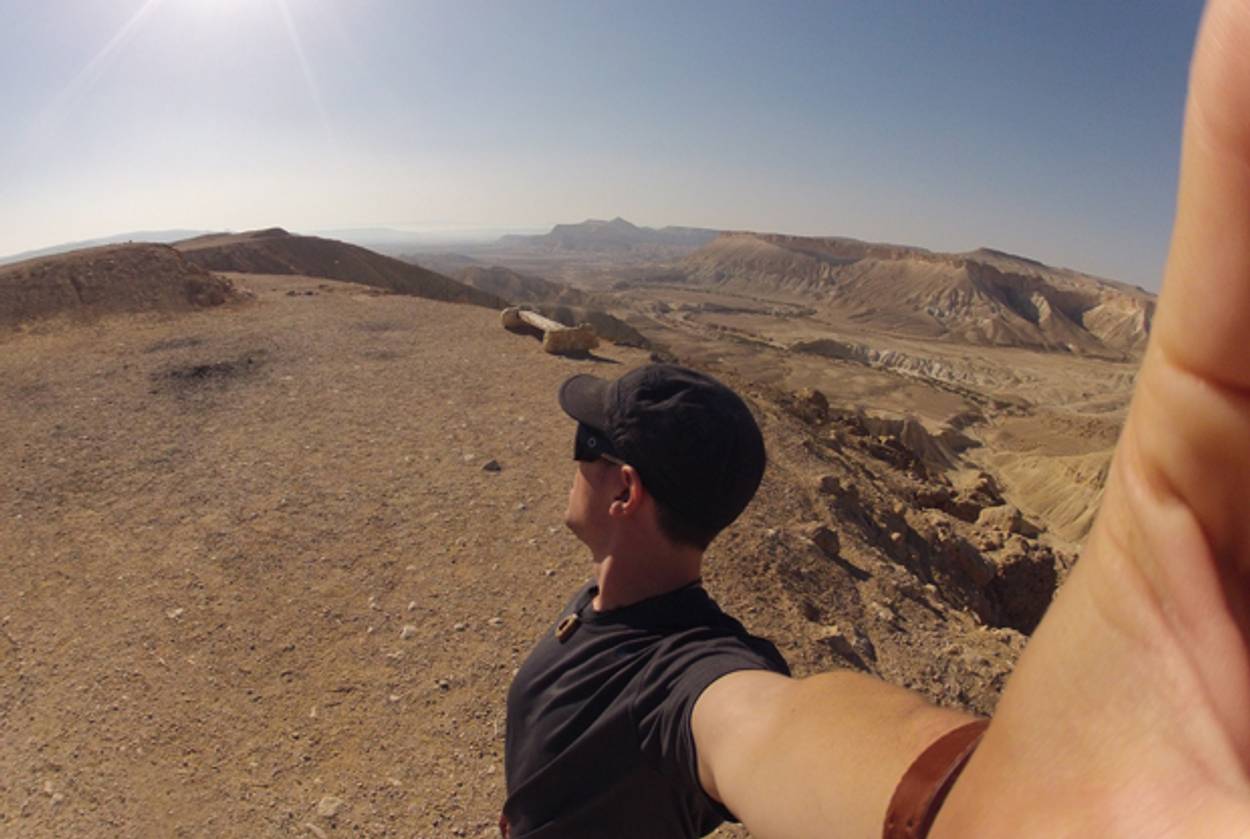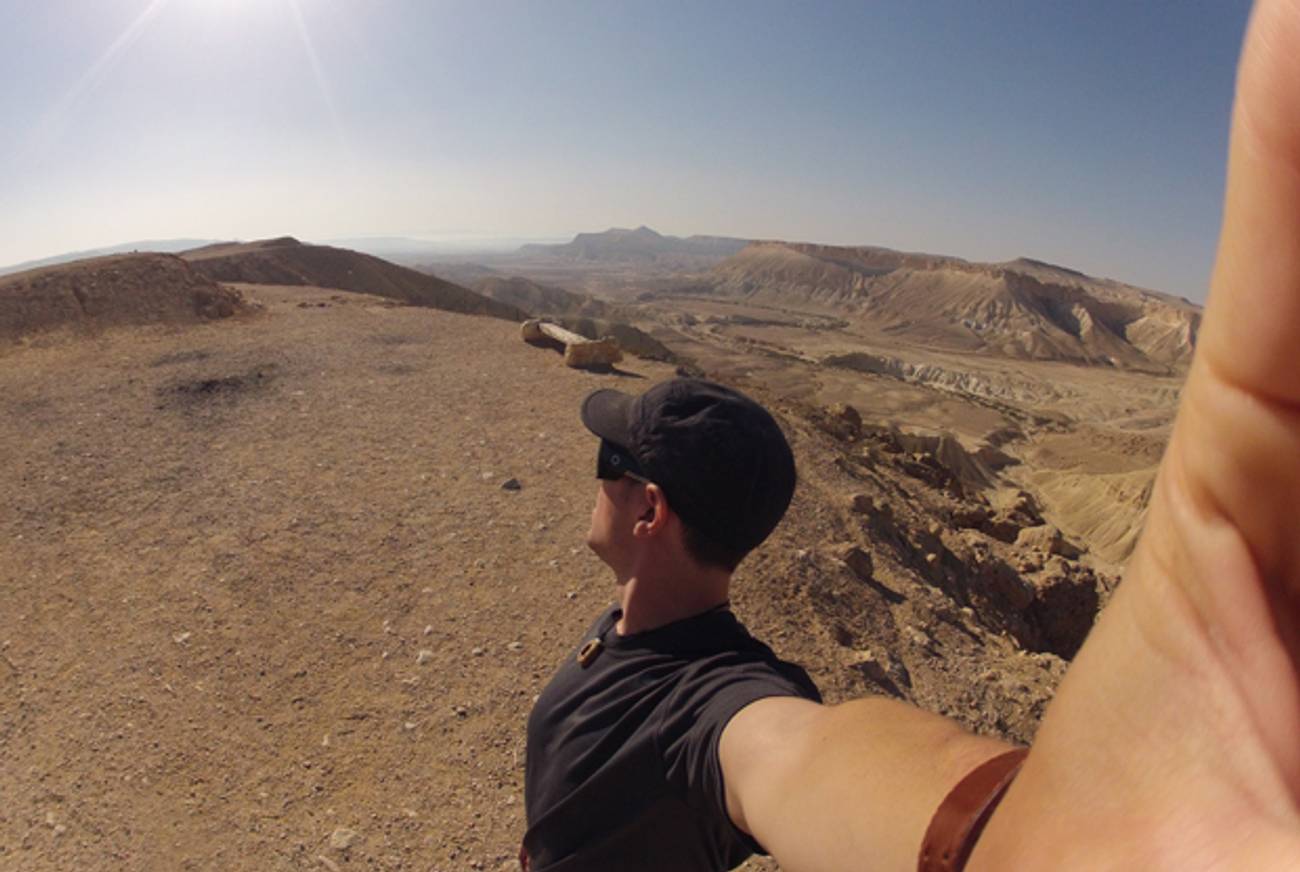How Birthright Changed Us
A trip to Israel connected participants to our Jewishness. But it didn’t make us more politically engaged.




On the final evening of our trip—in the sleepy, slightly seedy coastal city of Netanya most famous stateside for the Hamas suicide bombing that killed 30 people in 2002—I asked several participants the following, deliberately open-ended question: How did the past 10 days change your opinions of, or attitudes toward, Jewishness or Israel—if it did at all? I also asked one soldier, my Jerusalem roommate Chen Mor—a Navy man who had managed to join us for drinks—how his experience had changed his perception of Israel and American Jews.
Reading the responses, including my own, I’m struck by the extent to which Birthright seems to have worked—up to a point. It created young Jews who say they are more likely to engage with their Jewishness, and also ones with visceral connections to Israel.
On the other hand, it doesn’t seem that this feeling of connection translated into political awareness. In particular, the almost total lack of discussion of the Palestinian issue seems to have disarmed participants: I wonder what they will say when they are asked, back at campus or at work, about the issue; and I wonder what they (especially someone like the second respondent, Aimée) will decide for themselves in their own research. Birthright Israel is undeniably empowering, but it may not always empower in exactly the way some of its funders would wish. But, as our guide Yoav would say, that’s what makes us Jews.
Ben Engelberg: Coming in, I didn’t necessarily have any stereotypes, but I was open to broadening my horizon. One of the real thrills was being with the soldiers. Lots was just experiencing the land, but being with the soldiers brought a more personal connection.
It’s not like we had deep talks, but we realized that when you think of an IDF soldier—we think they’re different, but we have so much in common. Although our lives are so different. Maybe there are some things I’ve felt I would not do in my life, and I feel like if I had to do something like join the army I’d be more likely to do them.
Aimée Gogan: I’ve always been heavily involved with human-rights groups. I’m a women’s studies person, and there’s always been a focus on Palestinian women. I tended to avoid it, because I have always felt protective of [Israel], and Judaism in general. Now that I’ve been here, I do feel a deep connection to Israel, but I do think that when I get home I need to do a little—a lot—more research and find things out on my own. I feel I can no longer not engage. I’m a political person. Now that I’ve been to Israel, I feel responsible. Also, I brought my brother and sister.
There are a lot of people who have had a lot of problems. I read a Nation article before I came here. I told [my brother and sister] to keep an arched eye, but it’s hard when you’re here. You have this amazing tour guide, one of the most amazing people I know; these others; even you bloggers—I felt like when I would agree with you it made me feel right.
Today I was at Independence Hall, they played “Hatikvah,” and I cried, and I don’t know where that came from: lack of sleep; leaving; affiliation with people. I definitely need to take a step back when I get home.
Micah Levine: It really opened my eyes to the fact that there’s more to life than I was used to. I’d never traveled out of the U.S. It showed me what a connection to Judaism—the bond people can share can really bring people together. From Day One it was easy for us to click; by the time you leave you feel like you’ve known them for years.
Chen Mor (Israeli soldier): I saw a better picture of living in the Diaspora. Describing it is not like experiencing it. It’s different when you are with people not from here. I saw Israel through the eyes of Jews who aren’t. Every time you go to the Kotel, you have a different experience. This was one of those.
Molly Recht: My family is more religious than I am. I’m more about the tradition. I love that there’s something about being Jewish—you have a strong connection with other Jews, coming from the same background, and the lingo, as small as that is. Being here has deepened those roots.
I was saying, I have the urge to read the Torah, drop into synagogue. Today at Independence Hall in Tel Aviv [where David Ben-Gurion declared Israeli statehood], they said the United States government said, ‘Don’t do it now,’ and Ben-Gurion said, ‘If not today, then never’—I went up to the docent and asked her for it in Hebrew. I want to get it tattooed on my body. It’s just so inspiring. Our ancestors fought so hard for where we are now. It brought me closer to where I come from.
Ross Rubinstein: Before the trip, if I was asked if I was Jewish, I’d say yes. Now I have a whole new outlook: the soldiers, the history. The Jewish people have suffered for so long. I get the idea that everyone worked so hard for the Jewish faith. I appreciate it. It’s good to know you have a place.
Marc Tracy: I’ve always felt very strongly connected to my Jewishness, but I always tended to intellectualize my attachment to Israel, even before I began to work at Tablet Magazine—at which point I saw this detachment as additionally a professional obligation. Birthright renewed, and in some places gave birth to, a visceral and soulful attachment to Israel, but it also taught me that scholarly or journalistic detachment is a mistake because it makes you different from all the people you’re writing about. Israelis aren’t detached: They feel strongly about their country. (Israeli Arabs aren’t detached, either: A walk through Jerusalem’s Arab neighborhood of Abu Tor displayed much pro-Palestinian graffiti less than a mile from the Old City.) The Zionist right, the Zionist left, the post- or anti-Zionists—they don’t feel detached.
This isn’t about objectivity. In fact, true objectivity demands an awareness of your own subjectivity. I’m a Jewish Zionist. It was silly for me to feel detached, and I won’t anymore. This is a country I believe in, and one I happen to like as well. We’re all people, with various affiliations, and my own affiliation enables me to understand the affiliations of others. These, too, are facts on the ground.
But a lack of detachment can’t involve an abandonment of principles. I feel strongly about the importance of Israel, and I also feel bad about the occupation (which I was able to see a teensy slice of on a trip to Bethlehem Sunday), and triply so as a fellow Jew. So, my renewed connection to Israel fills me with a desire to get to know the people of Israel better—the better to understand why they have elected a right-wing government, and the better to see how I can make a difference in a country in which I do not (and do not wish to) vote; a country that I think speaks for me and that I think I can speak for, but only to a small extent, and while maintaining respect for the fact that it isn’t my country.
The fact that I am a professional Jew actually may have made me an ideal Birthright participant. I know what to say when the Palestinian issue is raised. I worry whether many of my fellow participants have just been loaded with a massive new personal commitment without the necessary grounding.
Ultimately, I emerge from this wanting to engage even more deeply with Birthright—I wouldn’t be shocked to find myself volunteering for it in some capacity—while at the same time using my detached, intellectual side (here’s where it comes in handy!) to point out its flaws and attempt to reform it to make it better. So, kinda how I feel about Israel.
Joe Vela: I never really had a connection with Israel and over the past years my connection with Judaism was disappearing. I haven’t felt the spiritual connection in a long time, haven’t been to temple for a couple of years—maybe for Rosh Hashanah. But now I want to go.
I was at the Kotel [Friday night], and I saw an acquaintance from school, and saw a good friend [who was on] a different trip. Then suddenly there’s 50 people singing “David Melech Yisrael,” spinning and jumping. And I put my friend on my shoulders. I would go to temple at home to feel like I was back here.
There’s something they couldn’t teach you in Hebrew School. Every corner you turn there’s so much history, and everyone’s speaking Hebrew.
Emily Walworth: I felt like I didn’t know much before, so definitely. I feel I want to learn more about Israel, the Israeli-Palestinian conflict—I want to research these things. I feel more in touch with a cultural side of Judaism. Being in touch with your roots—I feel I should make that connection more when I get home.
Sonia Wilk: It didn’t at all. I’d been to Israel before, technically for five days, but it was Yom HaAtzmaut and Yom HaZikaron. I don’t feel it changed me at all, but I am extending my trip for three weeks to see if Birthright propels me into a change.
***
Like this article? Sign up for our Daily Digest to get Tablet Magazine’s new content in your inbox each morning.
Marc Tracy is a staff writer at The New Republic, and was previously a staff writer at Tablet. He tweets @marcatracy.
Marc Tracy is a staff writer at The New Republic, and was previously a staff writer at Tablet. He tweets @marcatracy.